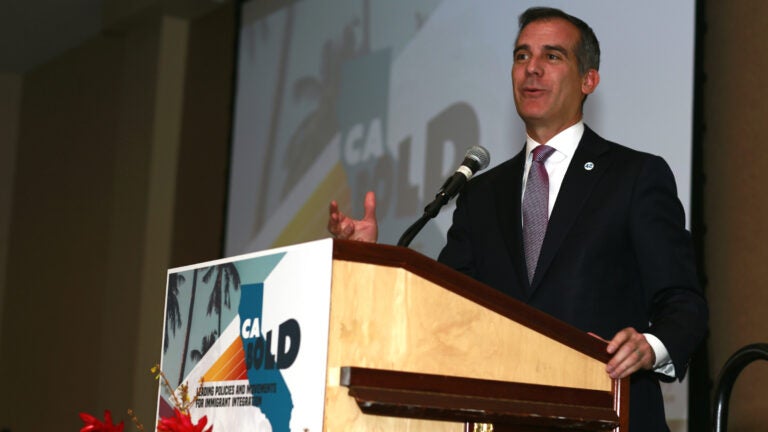
L.A. Mayor, USC Dornsife scholars and advocates address immigrant integration
Comprising more than a quarter of the state’s population, immigrants are part of California’s DNA. The 10 million foreign-born residents — more than any other state — make up more than a third of the Golden State’s labor force, and they and their children contribute more than $534 billion in state and local taxes each year, according to the nonpartisan, nonprofit Institute on Taxation and Economic Policy.
This is linked, at least in part, to California’s immigration policies, which scholars at USC Dornsife’s Center for the Study of Immigrant Integration (CSII) aim to hold up as a potential model of immigration practices for the remainder of the country.
On Feb. 7, CSII gathered more than 300 top advocates, activists, policy makers, community members, government leaders and scholars from throughout the state at the Radisson Hotel near USC for the California Bold conference. Their goal? Find novel solutions to help people new to the United States successfully join their adoptive communities.
“It’s been a very difficult time for both immigrants and advocates,” said Jody Agius Vallejo, CSII’s associate director, in her opening remarks. “Here in California, though, we’ve also seen a resurgence in resistance, and forward movement in immigrant integration at the state level and also in the state legislature.”
Roots in a diverse community
USC Dornsife Dean Amber D. Miller, welcoming attendees, noted the impact immigrants and their families have on Los Angeles in particular.
“We need not look any further than our own dynamic city to see the benefits of the rich diversity that comes from our immigrant history,” she said. “Data from 2014 indicates that foreign-born residents contributed $233 billion to L.A. County’s GDP that year — more than the GDP of Finland, Vietnam, Greece, New Zealand and many other countries.
“We are also a city unmatched in our variety of art, architecture, food, and music, largely due to our immigrant communities.”
Miller noted that the university’s roots are firmly embedded in the region’s diversity.
“Here at USC, a university that has grown up within the thriving multicultural hub that is Los Angeles, hundreds of faculty and thousands of our staff and students are immigrants, as are five of my fellow deans and our university president,” she said. “This is a place where we celebrate our diverse community as a source of great strength and wisdom.”
Strategies for progress
Vallejo, associate professor of sociology and American studies and ethnicity at USC Dornsife, and Manuel Pastor, CSII director and professor of sociology at USC Dornsife, called on conference participants to think about research needed to generate information that could be used to defend immigrants, develop new policies and deploy methods for immigrant integration.
Several strategies emerged from the day’s discussions, among them the need to ensure the 2020 Census count is accurate, particularly since anti-immigrant rhetoric could discourage immigrants from responding, artificially lowering the population count and hurting California’s ability to obtain federal support.
The group highlighted the importance of building leadership among young people and creating important alliances that connect academic research, community organizations and policy makers. This could help ease racial tensions behind much of the anti-immigrant sentiment and help citizens see the value in a shared future, Vallejo and Pastor said.
Anchoring these efforts would be a newly created data hub housing information and analysis on the social and economic contributions of immigrants.
Aiming for better, locally and nationally
Pastor, who also holds the Turpanjian Chair in Civil Society and Social Change, reminded participants that while California might be a model for immigration practices and policy, it could be better.
“We … know that California can’t go it alone, and also that this change hasn’t come to every place in California,” he said. “So, we need to figure out how to deploy, how to scale, how to get bigger, how to have more impact.”
Los Angeles Mayor Eric Garcetti, in his welcoming remarks, appeared to affirm Pastor’s message. “We as a country will only prosper when what we have — this conversation in here — spreads to those who need to be reminded of what this nation is about.”